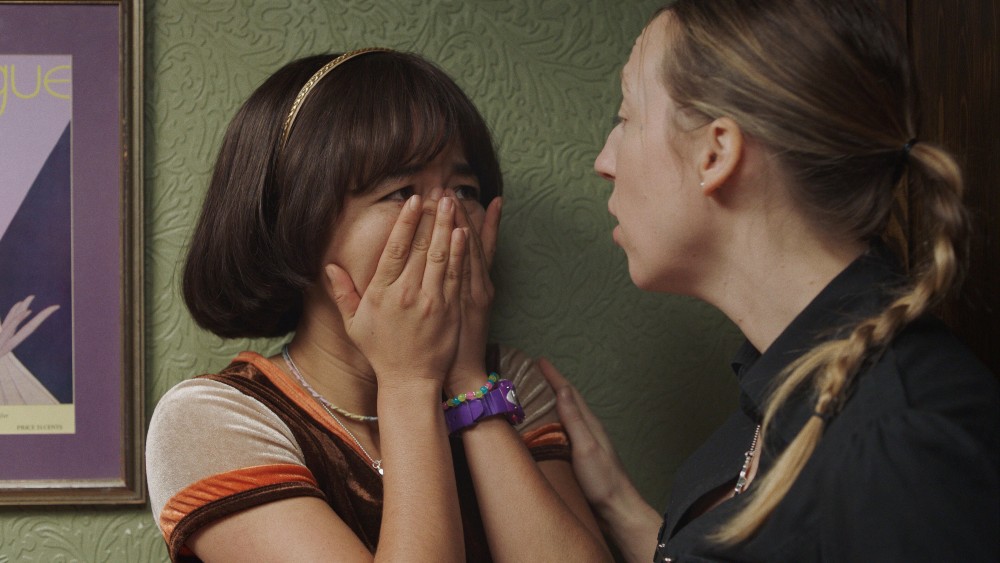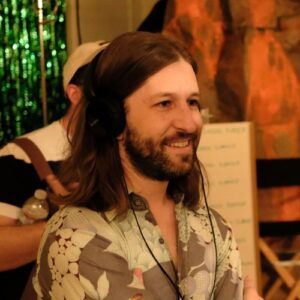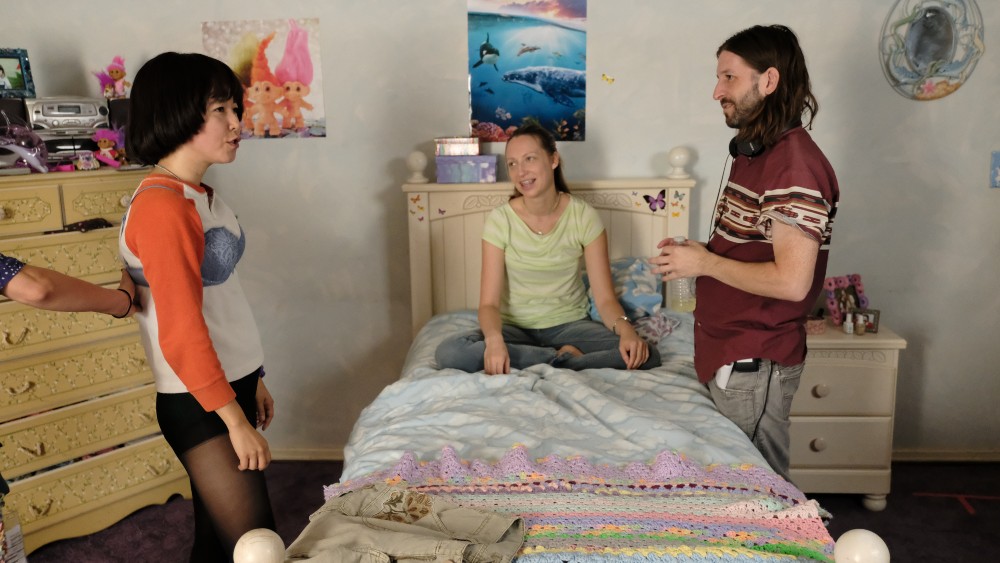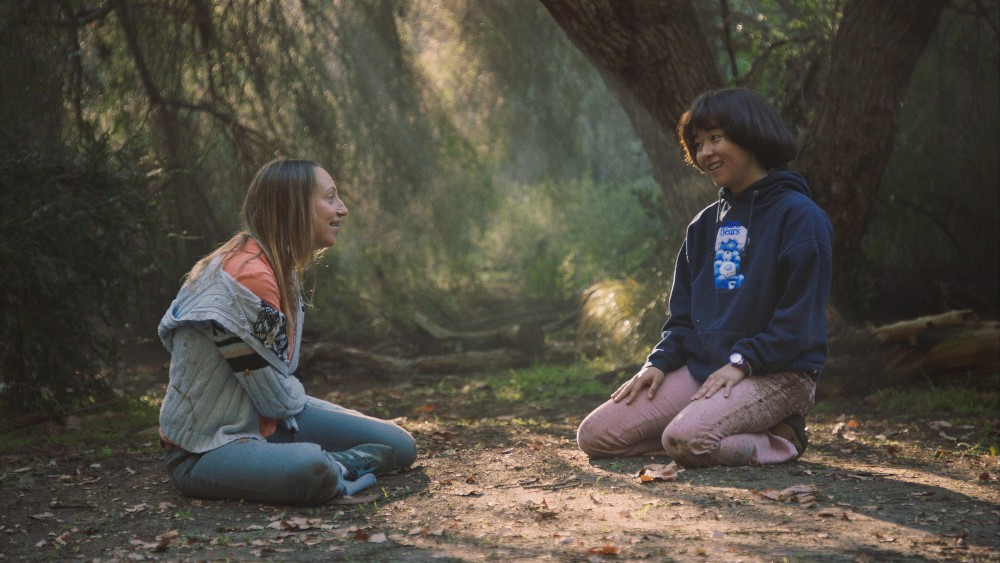
For many directors, the road to directing their first feature can be a long and winding one. Fortunately, for Sam Zvibleman, he has spent the past twelve years working on a series of short films and webseries that prepared him for Pen15. Starring Maya Erskine and Anna Konkle, the show’s co-creators and co-writers, the Hulu comedy series is a hilarious look at middle school with the two 30-something actresses playing their younger namesakes as they deal with love, relationship, sex and other things with which teen girls are concerned.
Zvibleman co-created the show with Erskine and Konkle, and he’s involved with the writing and exec. producing on the series, but more importantly, he’s directed 11 of the 17 episodes in the first two seasons that have aired. He also has been developing that first feature, called Imagine the Moon, which he hopes to start filming while the show is on break before airing the second half of Season 2.
Talking over Zoom a few weeks back, Below the Line spoke with the young director about the origins of Pen15, why he decided to direct most of the second season himself, and how the series fared when COVID (and a dual pregnancy) hit. The interview also ends with an amusing anecdote about a location scout for the aforementioned feature.

Below the Line: What was your background? Did you go the traditional film school route to becoming a director?
Sam Zvibleman: I actually went to school for journalism first, because I grew up in Missouri, and there was no concept of writing or directing or filmmaking. That was so alien to me. Luckily, I ended up studying print journalism at USD, and then took a film class just because it was this great film school — everyone should take a film course kind of for fun. I was like, “Oh, that’s cool. I can watch movies and it seems easy,” and actually just immediately fell in love with filmmaking through that class and switched in and then completely disowned journalism. And then, it was all in from that point. I didn’t even watch movies or tv growing up at all. It was all watching the great films of all time in college on the big screen when I was curious. That was sort of my journey, so then they were like, “Well, if you want to make films, you should learn how to write scripts.” I know how to write. I do that in journalism, so I wrote a bunch of really bad scripts, but gained some practice. Made short films. Maya and Anna saw those short films, and that’s sort of how we linked up. We were becoming best friends at the time, too.
BTL: You were all in L.A. at that point?
Zvibleman: Anna had just come from New York. Maya was in L.A. I sort of fell into this group of friends who are actors and filmmakers from New York, and that included Anna and Maya, the same group actually, that made Plus One. All those people are from the same kind of group and class. I really responded to the New York film community and acting community way more than the L.A. and USC group, for whatever reason, sensibility things, so I was really lucky to find them. They approached me and asked if I wanted to make a TV show with them, and I was like, “Hell yeah, you guys are the funniest people I know. Cool. I’m all in.” We would just sort of get together in one of our houses a couple of times a week and brainstorm ideas, and eventually, we came up with Pen15.
BTL: The wall between filmmaking and journalism is such a thin one with a lot of crossover back and forth.
Zvibleman: I sort of like the fiction — you can lie in movies and stories. In journalism, you have to be very true and clear, and I am very much not being clear, and being poetic and making sh*t up. It seemed that in Missouri if you can half string a sentence together, “You should write for the newspaper.”
BTL: As far as the idea for Pen15, was that something Anna or Maya had been wanting to do for some time, or was that the three of you just sitting down and saying, “This would be funny. Let’s do a show on this,”?
Zvibleman: It’s just telling stories, and eventually, we liked that one. I can still remember their eyes when we came up with that, and it was very clear, like, “Yes. We have a million stories from middle school, and they’re all amazing. Let’s pursue that.”The tone sort of evolved over the years, but the initial idea we had for a while.
BTL: There was never a point where you thought, “Let’s get some young actors and do something like Book Smart or Eighth Grade,” all with kids? It was always going to be Maya and Anna?
Zvibleman: They were the actors, so like, “What can we do with the actors?” This was way before all those movies came out, too. It took kind of a weird trip making it to screen. We came up with this seven years ago. But then, the tricky part was convincing people with money and distributors that the idea would work, and that it wasn’t kind of a sketch like a Strangers with Candy or an SNL skit. We had to really work to sort of find, “How do you love these characters?” And not just, “Isn’t it funny that they’re hitting on boys?” Which was funny, but you need more.
BTL: That layer of funny is more than enough for me to enjoy the show, imagining 30-year-old actresses doing a make-out scene with a 15-year-old boy, which probably makes it the best day of their life. The humor in that just works.
Zvibleman: It’s extremely funny just watching the kids on set trying to figure out what’s going on.
BTL: Once you had the idea developed, how did you work on the look of the show and where it was going to be based? Was a lot of stuff taken from your own middle school experiences?
Zvibleman: Most of the stories tended to come from one of our three lives. We almost treated it like a memoir — remember this? The work of the writing is how do you connect these things that are just moments and make them stories. The look of the show, because it’s set in the year 2000, the main influence was Welcome to the Dollhouse by Todd Solondz. It’s sort of like that very low-fi indie ’90s feel where they kind of just don’t have a lot of money. It’s simple lighting. It’s very sort of dry and dark. Of course, our show wasn’t as nihilistic and ballsy as that movie. We had our own sort of voice, but that was the original sort of impetus. We want to play Dawn from Welcome to the Dollhouse and tell it how it really was, and not kind of Disney-fy it or Nickelodeon-fy it, and make it shiny and sterile and clean and washing over the really more truthful obstacles from the age and really hit them straight on. We had this great key to that with older actors being able to do it.
BTL: You said you started working on this seven years ago, so where was streaming as an outlet for a show like Pen15 seven years ago? I imagine Netflix was already an entity for a show like it.
Zvibleman: Yeah, it was very new. It was like, “Why aren’t we on television? We want to be on HBO or something that people turn on” and then very quickly during that time, Netflix became a thing. Hulu was the one who got it and was super enthusiastic right from the start. They had sort of young creative people who really saw what we were doing and kind of the art piece idea, the big idea behind it and that it wasn’t just some silly girls running around and being sketchy and improper, because that’s not what Maya and Anna are. I mean they’re trained actors. They don’t see themselves as comedians or comic actors. You should see Maya do Shakespeare. She’s incredible — you saw Plus One. She’s just like Stanislavski. She knows what she’s doing.
BTL: Did you have any production designers or DPs in that circle of NY expat friends in L.A.?
Zvibleman: My longest collaborator is the cinematographer Andy Rydzewski, who I’ve worked with for 10 or 15 years. I try to get him to shoot everything I do. We just have such a shorthand, that it’s like we call each other, he’s my filmmaking wife. We always just push each other. I think that’s the best part. “How can we make this more interesting? We’ve already done this shot at the locker, how can we start the scene differently and make bold choices? And how do we do this [in a way] that’s not coverage?” Typical, it’s your shot and now it’s your shot talking, and it’s your shot talking, the typical comedy thing. We challenge each other to make it cinematic and are friends outside.
I mean, every department — production design, costume, hair and makeup — there’s such a specificity to that time period. Even like what they’ll do to Anna’s hair. She’s got this popular-at-the-time zigzag hair that you only catch if she looks down. But that kind of detail or it’s all over the wardrobe. Just little details that really we don’t try to show off and make a big deal [about]. “Look at our nostalgic thing that we pulled off.” It’s just kind of there if you want to see it. I just think that makes it more rewarding. It’s such a family, because we shot the first season for a web series size budget, and everyone killed themselves, not knowing if the show is going to turn out. You want to stick with those people, that’s your family, that’s like the Pen15 family, who really brings it and is invested and breaks their ass to do that.

BTL: You’ve directed 11 of the 17 episodes of the show, which is unusual, since it’s not often that a director who is a creator who directs the pilot directs as much of the show as you do. It’s almost less common than it is common. Was that something you three decided from the beginning?
Zvibleman: I just sort of wanted to. I love directing. I love filmmaking. At the end of the first season where I did the last four episodes, I found myself really hitting a rhythm and being able to communicate and getting stronger and getting better. And then you’re forced to stop. And then you’re like, “What happened to all that thing I built?” And then you gotta start all over.
So this season, I was sort of like, “Well, why don’t I not stop the train?” It happened again, and you just get better. Just being the creator and being in the writers room, I know the show. I know every bit of motivation, and I sort of like this cohesive vision in movies and other shows that do that. There’s not a lot, especially in comedy, but I found that we don’t really talk about our show. We talk about dramas when we’re in the writers room, so I just wanted to and I feel like I earned that trust.
BTL: How did you decide who to come in and direct the other episodes and where they step in to give you a break for a while?
Zvibleman: We have another block coming out, and it’s the same idea. We brought back the two directors who did such a great job with the first season and are a huge part of our success. It’s just kind of like sticking with who you go to war with and who did a great job. We had success, and so let’s ride that and reward everyone who were a part of it.
BTL: Was the show interrupted by COVID? Were you in the middle of shooting a season and had to stop or were you always planning on taking a break and splitting the second season? How did COVID affect what you were doing?
Zvibleman: COVID wreaked havoc. We had these two seasons that we shot at once. We shot the seven that just came out — those are the ones that I directed. What happened was we finished that. I went to edit those seven episodes while they continued shooting the next seven episodes, so I wasn’t even on set. I’d show up on my way to the edit bay or whatever, and we were about four or five days from finishing those next seven when COVID shut us down. I had to continue editing like this — it was terrible. It’s just not a good thing, so technically, there’s a few more days of finishing those other seven that aren’t in the can, but it’s mostly shot. It was always supposed to come out at a separate time.
BTL: So you almost finished shooting those last year and you just need three or four more days to finish them up?
Zvibleman: It’s like four or five I want to say. Not bad, it’s mostly there.
BTL: But it’s going to be six months later?
Zvibleman: Yeah, the kids are gonna have grown beards. Even [between] Season One and Two, it’s like, “You’re a grown-ass man now.” Oh, well. That’s what middle school is. You wake up one day…
BTL: What is this movie that you’re working on? Is that something you shot already or something you’re shooting soon?
Zvibleman: They’re trying to pull together this movie that I have? It’s called Imagine the Moon. Judy Greer is in it, and then we’re trying to now cast some more. Right now, it’s this game of needing to cast it to get the money, so I don’t even know.

BTL: So a pretty typical indie film, trying to get things to come together. What year are you on with it from when you started?
Zvibleman: I can’t even tell you, but yeah, it’s the right question.
BTL: Are you over 10 years yet trying to make it?
Zvibleman: No, so I have a few more years. Otherwise, it’s how these things go. It’s crazy.
BTL: I think it took Derek Cianfrance something like 15 years or more to get Blue Valentine made. That might be the record.
Zvibleman: I believe it. I would have dropped it at a certain point in my life, but now I’m like, “Yeah, that seems right on track.”
BTL: Are you still doing post on Pen15 or is that done now?
Zvibleman: Right now, there’s maternity leave happening. Anna and Maya both had children very recently. So I am writing. I’m sort of back to my own feature stuff and developing and writing feature scripts and trying to get back into my first love of feature film.
BTL: Will you draw from that same group of people that did Pen15 and Plus One who you still work with?
Zvibleman: Oh, yeah. That’s the whole thing. You understand why people work together, because there’s a trust, and there’s similar sensibilities. I talk to Andy, and I’m like, “Hopefully, in 30 or 40 years, we’re in Italy having a siesta and making a film together and getting drunk and telling stories,” and the same with all the other crew, just our own little circus traveling around and making stuff. You hope. You never know. We’re on the early side of it, but that’s like the life I want to lead.
BTL: I talk to directors a lot about working with the same crew for that shorthand but then having to change things due to scheduling, because not everyone can be like Scorsese where they have the same people who will drop everything to work for him. It takes some time to get there.
Zvibleman: What’s funny is that I went to Oklahoma last summer to scout, because I was supposed to do the movie that I’ve been working on, Imagine the Moon, there. Oklahoma’s got these great tax benefits. That’s the reason to go there, and as I’m there, Scorsese, his team had just come to scout for his new movie shooting, Killers of the Flower Moon, and we realized we would have no crew. That’s it, and it was basically, like, “Yes, please. You take everything you need. I just want to see your movie. I can find another state to shoot in.” The entire state was just hungry and thirsty for that movie to come. There would just be nobody left.
You can watch the first 17 episodes of Pen15 on Hulu. All photos courtesy Hulu, except where noted.






